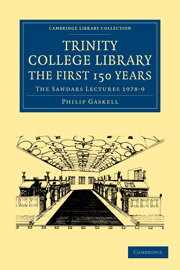Summary
One period in the history of one College Library may not seem much of a subject for a book, but there are two reasons why it is worth investigating the early history of Trinity College Library in some detail. One is that a number of Trinity men – more perhaps than of the members of any other college – contributed importantly to England's spiritual, intellectual, and scientific development from soon after the foundation of the college in 1546 until the end of the seventeenth century, so that the state of its working library during this period is of unusual interest. The other reason is that the investigation helps to illuminate the process whereby Trinity Library grew from small beginnings into the greatest of all the Oxford and Cambridge college libraries, rich both in contents and in setting.
To summarise the story: it appears that in 1546 Trinity inherited the libraries of its two constituent colleges, Michaelhouse and the King's Hall, but that Trinity was amongst those colleges which parted with virtually the whole of their pre-Reformation libraries during the religious upsets of the mid-century, so that scarcely any trace of its founding collections survived into the seventeenth century. There is in fact very little that we know for certain about the contents of Trinity's Library in the sixteenth century, though we can infer a good deal from the small and uneven collection of books which the College owned in 1600.
- Type
- Chapter
- Information
- Trinity College Library. The First 150 YearsThe Sandars Lectures 1978–9, pp. xi - xivPublisher: Cambridge University PressPrint publication year: 2010First published in: 1980

